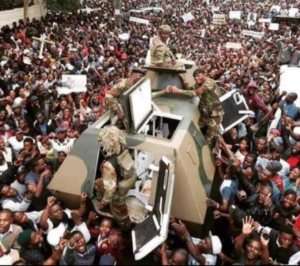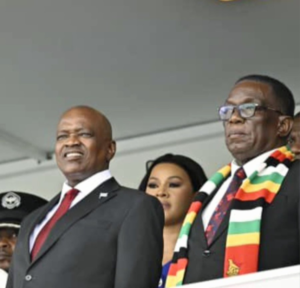THE UNSEEN STORY: ZIMBABWE’S MEDIA MONOPOLY & THE SILENCE OF THE OPPOSITION
The recent events unfolding in Zimbabwe illuminate a haunting, eerie reality — the palpable suppression of media coverage for the opposition Citizens Coalition for Change (CCC), with the Zimbabwe Broadcasting Corporation (ZBC) playing an instrumental role in this pattern.

There’s a peculiar absence of diversity in the country’s mainstream media, particularly in the news sector, with the state-controlled ZBC ostensibly only focusing on the rallies and activities of the ruling ZANU-PF party. This biased narrative could be more than a coincidence; it indicates an unhealthy relationship between the government and the media that seems to have led to a stranglehold on Zimbabwe’s broadcast journalism.
State media coverage forms the backbone of the political narrative in most countries, Zimbabwe included. By exclusively covering ZANU-PF rallies, ZBC seems to function as an active player in political maneuvering rather than as an unbiased reporter of events. Not only does this paint an incomplete picture of Zimbabwe’s political landscape, it significantly disadvantages the opposition CCC.
The incumbent party’s events are exhaustively aired and analysed, while opposition rallies go largely unnoticed by the public eye. Uninformed citizens cannot make balanced decisions, which undermines the whole premise of a democratic society, that is, an electorate making an informed decision based on a complete overview of the facts.
So why is there such blatant media suppression? The answer may lie within the deep-seated political control mechanisms. In Zimbabwe, it appears that media platforms, particularly state-owned, are not fully independent; they are potentially captured entities, functioning more like propaganda machines than impartial news outlets.
Media capture is a severe problem that arises when governments or powerful entities manipulate the news to suit their objectives. In Zimbabwe’s case, the media’s apparent capture by ZANU-PF, is potentially detrimental to the democratic process. The opposition CCC is facing a stifling environment where their voices are drowned out, their actions made invisible, and their campaigns left in obscurity.
However, the consequences go far beyond the immediate political implications. This media monopoly limits public scrutiny of government activities, promoting a culture of impunity and corruption. In the long run, it might discourage political participation and stifle political innovation, creating a stagnating political environment.
The international community, especially democratic institutions and press freedom advocates, should pay more attention to Zimbabwe’s situation. Urgent pressure is needed to advocate for fair and balanced media coverage, a necessary condition for free and fair elections.
For Zimbabwe to realise its full democratic potential, the media landscape must change dramatically. ZBC must liberate itself from the clutches of political capture and fulfil its mandate to provide balanced and impartial news to the Zimbabwean public. This balance includes airing the opposition CCC’s rallies and giving their political standpoints the attention they deserve.
Only then can the citizens of Zimbabwe make informed decisions, and only then will the nation witness the full bloom of its democracy. The future of Zimbabwe relies on the freedom of its press, the diversity of its political coverage, and the integrity of its media organisations.
“The Unseen Story: Zimbabwe’s Media Monopoly & The Silence of the Opposition” is far from fiction. It is a clarion call to the world to recognise and respond to a crisis. As George Orwell penned, “In a time of deceit, telling the truth is a revolutionary act.” In Zimbabwe, that revolution is long overdue.



